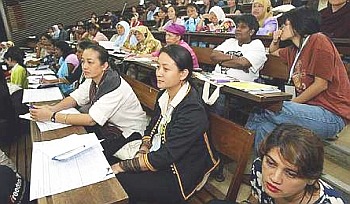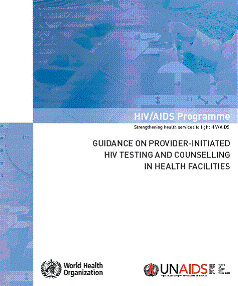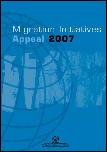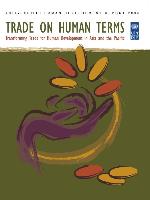');
document.writeln(''+'ipt>');
}
|
West Asia:1st Regional Conference on Migrant Workers |
|
|
� Rights of migrant workers in Asia and Arab regions were discussed at the first of its kind inter-regional conference held in Doha, Qatar on 10 and 11 June 2007. The conference reaffirmed the right for migrant workers to be free from arbitrary arrest and detention, the right not to be deported without prior review of their cases by an independent judiciary, the right to be free from torture, slavery and slavery-like conditions and the right to freedom of belief and religion. Bahrain Center for Human Rights (BCHR) in cooperation with Bahrain Human Rights Society (BHRS), National Human Rights Committee of Qatar (NHRC), and International Federation for Human Rights (FIDH) organised this first inter-regional conference to discuss the situation of migrant workers in Asia and the Arab world. This conference gathered 50 participants, including Qatari Officials, embassies from Asian sending countries and representatives of the civil society, human rights NGOs and trade unions from several Arab and Asian origin and host countries. Regional Coordinator for CARAM Asia, Cynthia Gabriel made a presentation on Causes of The Migration Flow during the conference. Click here for a comprehensive set of recommendations from the conference. |
�
|
PITC Consultation Meeting |
|
|
 Some 73 participants from 12 countries, representatives from the World Health Organization (WHO), the United Nations Children's Fund (UNICEF), the Joint United Nations Programme on HIV/AIDS (UNAIDS), Secretariat of the Pacific Community (SPC), South Asia Association for Regional Cooperation (SAARC), governments and civil society, including CARAM Asia, gathered for the joint WHO/UNICEF/UNAIDS Technical Consultation on Scaling-up HIV Testing and Counseling in Asia and the Pacific from 4 to 6 June, 2007 in Phnom Penh. The objectives of the consultation were: - To review HIV testing and counseling policies and practices in different settings and contexts in Asia and the Pacific
- To discuss the role of provider initiated testing and counseling (PITC) in complementing existing voluntary counseling and testing services
- To emphasise the need for HIV testing and counseling to be grounded in public health methods, ethical principles and human rights values
- To identify and agree on key actions for follow-up at regional and country level for policy and programme implementation.
Read more here and click here for the conclusion and recommendations. |
�
|
Malaysia: 1st Fiesta Feminista |
|
|
 CARAM Asia, Tenaganita and Malaysian AIDS Council joined hands to organise a panel discussion entitled Women Migrant Workers: Multiple Discrimination, Multiple Struggles on 17 June, 2007 at the first Fiesta Feminista held in Malaysia. The discussion focused on the lack of protection and realisation of labour and health rights of female migrant workers who face unique obstacles to their full enjoyment of human rights due to a combination of gender, race, ethnicity, language, immigration and class status factors. More details here . |
�
 WHO and UNAIDS issued new guidance on informed, voluntary HIV testing and counselling in health facilities on 30 May, 2007 with a view to increase access to needed HIV treatment, care, support and HIV prevention services.� The new guidance focuses on provider-initiated HIV testing and counselling (PICT). WHO and UNAIDS issued new guidance on informed, voluntary HIV testing and counselling in health facilities on 30 May, 2007 with a view to increase access to needed HIV treatment, care, support and HIV prevention services.� The new guidance focuses on provider-initiated HIV testing and counselling (PICT).
The document recommends an “opt-out” approach to provider-initiated HIV testing and counselling in heath facilities, including simplified pre-test information, consistent with WHO policy options developed in 2003 and with the 2004 UNAIDS/WHO Policy Statement on HIV Testing. With this approach, an HIV test is recommended 1) for all patients, irrespective of epidemic setting, whose clinical presentation might result from underlying HIV infection; 2) as a standard part of medical care for all patients attending health facilities in generalized HIV epidemics; and 3) more selectively in concentrated and low-level epidemics. Individuals must specifically decline the HIV test if they do not want it to be performed. Read… � |
�
|
IOM: Migration Initiatives Appeal 2007 |
|
|
 Migration is increasingly recognised as a key global phenomenon with significant local impact. Its multi-faceted and cross-cutting nature requires it to be analysed and addressed with due regard to related policy spheres such as development, trade, human rights, disaster response, health and the environment, among others, at the national, regional and global levels. Migration is increasingly recognised as a key global phenomenon with significant local impact. Its multi-faceted and cross-cutting nature requires it to be analysed and addressed with due regard to related policy spheres such as development, trade, human rights, disaster response, health and the environment, among others, at the national, regional and global levels.
While IOM is the only inter-governmental organisation with a mandate exclusively focused on migration, it works systematically with governmental, intergovernmental and non-governmental partners in carrying out a full range of migration services which assist in meeting the operational challenges of migration management.
This issue of Migration Initiatives provides an overview of IOM’s wide thematic as well as geographic range of work. Some migration issues are of an ongoing nature, while others, specifically those related to disaster and conflict, are less predictable. The diversity of projects illustrated in this document is a reflection of the variety of challenges posed by migration. IOM’s decentralised structure of country offices, missions with regional functions and special liaison missions is specifically designed to respond to the multitude of different migration needs on the ground. It is through the combination of international and local expertise that IOM strives to address each project effectively. Read …
� |
�
|
Asia Pacific Human Development Report 2006 |
|
|
 The Report highlights that free trade can benefit the poor of Asia-Pacific if countries adopt bold new policies that harness trade and economic growth to promote people’s well-being. It also highlights the important sub-regional variations in employment performance across the region. Employment growth increased slightly in South Asia, but plummeted in East Asia, mainly because of a slowdown in employment growth in China. Read ...
� � � � � � � � � � |
�
|
A Life Free of Violence Is Our Right! |
|
|
|
� The UN Trust Fund to End Violence Against Women was set up by UN General Assembly resolution 50/166 and became operational in 1997. To date, it has granted more than US$13 million to 231 innovate and catalytic initiatives in more than 100 countries around the world that aim to break new ground, strengthen inter-agency partnerships, and mobilise new constituencies in the growing movement to end violence against women in all its forms. This booklet captures examples of promising approaches that Trust Fund grantees have used to eliminate multiple forms of violence in women's lives. It showcases grantees' work with diverse constituencies — including survivors of violence, HIV-positive women, men's groups, the judiciary, school teachers and students — in the media, and in variety of contexts. It seeks to demonstrate how grantees have succeeded in breaking intergenerational cycles of violence, in empowering survivors to make changes in their own lives, in transforming communities and institutions into advocates for change, and in advocating for enabling policies and legislation. Read more...
�
|
�
|